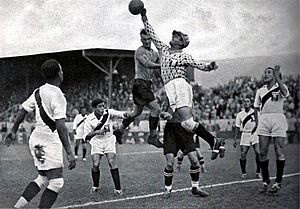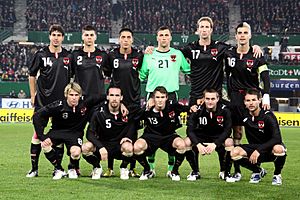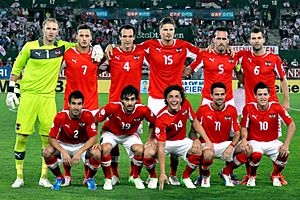Austria national football team facts for kids
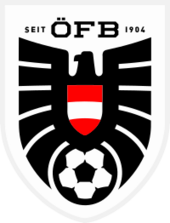 |
||||||||||||||
| Nickname(s) | Das Team (The Team) Burschen (The Boys) Unsere Burschen (Our Boys) |
|||||||||||||
|---|---|---|---|---|---|---|---|---|---|---|---|---|---|---|
| Association | Österreichischer Fußball-Bund (ÖFB) | |||||||||||||
| Confederation | UEFA (Europe) | |||||||||||||
| Head coach | Ralf Rangnick | |||||||||||||
| Captain | David Alaba | |||||||||||||
| Most caps | Marko Arnautović (125) | |||||||||||||
| Top scorer | Toni Polster (44) | |||||||||||||
| Home stadium | Various | |||||||||||||
| FIFA code | AUT | |||||||||||||
|
||||||||||||||
| FIFA ranking | ||||||||||||||
| Current | 23 |
|||||||||||||
| Highest | 10 (March–June 2016) | |||||||||||||
| Lowest | 105 (July 2008) | |||||||||||||
| Elo ranking | ||||||||||||||
| Current | 28 |
|||||||||||||
| Highest | 1 (May 1934) | |||||||||||||
| Lowest | 75 (2 September 2011) | |||||||||||||
| First international | ||||||||||||||
(Vienna, Austria; 12 October 1902) |
||||||||||||||
| Biggest win | ||||||||||||||
(Salzburg, Austria; 30 April 1977) |
||||||||||||||
| Biggest defeat | ||||||||||||||
(Vienna, Austria; 8 June 1908) |
||||||||||||||
| World Cup | ||||||||||||||
| Appearances | 7 (first in 1934) | |||||||||||||
| Best result | Third place (1954) | |||||||||||||
| European Championship | ||||||||||||||
| Appearances | 4 (first in 2008) | |||||||||||||
| Best result | Round of 16 (2020, 2024) | |||||||||||||
|
Medal record
|
||||||||||||||
| Website | oefb.at | |||||||||||||
The Austria national football team represents Austria in international football games. It is controlled by the Austrian Football Association. The team is often called Das Team (The Team) or Burschen (The Boys).
The Austrian Football Association (ÖFB) started on March 18, 1904. In the 1930s, under coach Hugo Meisl, Austria's team was known as the "Wunderteam" (Wonder Team). They were very strong in European football. They finished fourth in the 1934 FIFA World Cup and won a silver medal at the 1936 Summer Olympics. In 1938, Austria became part of Nazi Germany. This meant the ÖFB was closed, and Austrian players had to join the German team for the 1938 World Cup.
After World War II, Austria's team was restarted. They did very well in the 1954 FIFA World Cup, finishing third. They stayed strong through the 1950s and 1960s. A big moment was beating England at Wembley Stadium in 1965. The team had ups and downs in later years. They missed some World Cups but made it to the second round in 1978 and 1982. A famous win was against West Germany in 1978.
The 1990s and 2000s were tough. They had a surprising loss to the Faroe Islands in 1992. They also exited the 1998 World Cup in the group stage. This was their last World Cup appearance so far. Austria automatically played in UEFA Euro 2008 as co-hosts with Switzerland. This was their first time in the UEFA European Championship, but they were out in the group stage. The team started to get better around 2016. They successfully qualified for UEFA Euro 2016, Euro 2020, and 2024. Their current coach is Ralf Rangnick.
Contents
History of Austrian Football
Early Years and the "Wonder Team"
The Austrian Football Association (ÖFB) was created on March 18, 1904. In the 1930s, coach Hugo Meisl led the team to great success. They were called the "Wunderteam" because they played so well. Matthias Sindelar was a big star on this team. On May 16, 1931, they were the first team from mainland Europe to beat Scotland. In the 1934 FIFA World Cup, Austria finished fourth. They lost to Italy in the semi-finals and to Germany in the third-place match.
The team qualified for the 1938 World Cup. However, Austria became part of Germany on March 12, 1938. This event was called the Anschluss. Because of this, the ÖFB was closed, and Austria had to pull out of the World Cup.
After World War II Successes
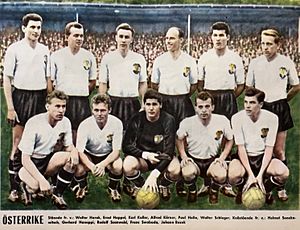
Austria's team was rebuilt after World War II. They had a great run in the 1954 FIFA World Cup, finishing third. This was a big achievement for the team.
In the 1982 FIFA World Cup in Spain, Austria played West Germany. Both teams knew that if West Germany won by one goal, both would move on. After an early goal by West Germany, the teams stopped trying to score. This match became known as the "non-aggression pact of Gijón". Because of this game, all future World Cup group matches are played at the same time.
21st Century: Ups and Downs
Early 2000s Challenges
Austria automatically qualified for UEFA Euro 2008 because they were co-hosting the tournament. Many people thought they would struggle. Some even signed a petition asking Austria to withdraw. However, Austria managed a 1–1 draw with Poland. They lost 1–0 to Croatia and Germany, and were eliminated in the group stage.
2010s: New Beginnings
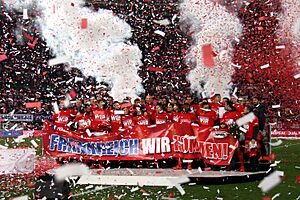
Austria had a very strong qualifying campaign for UEFA Euro 2016. But the tournament itself was difficult. They lost 0–2 to Hungary and drew 0–0 with Portugal. They then lost 1–2 to Iceland and were out of the tournament with only one point.
2020s: Breaking Through
At UEFA Euro 2020 (played in 2021), Austria made it to the knockout stage for the first time. They finished second in their group after beating North Macedonia and Ukraine. They lost a close game to Italy 2–1 in extra time in the Round of 16.
Austria also qualified for UEFA Euro 2024 in Germany. They were in a tough group with France, the Netherlands, and Poland. Austria surprisingly finished first in their group, which was a historic achievement. However, they were eliminated in the Round of 16 after losing 2–1 to Turkey.
Team Rivalries
The match between Austria and Hungary is one of the most played international football games. Only Argentina and Uruguay have played each other more often. Since World War II, Germany has been Austria's main rival in football.
Team Kits and Crest
The home kit for the national team is usually a white shirt, black shorts, and white socks. These colors come from an old German flag. The away kit is red shirt, white shorts, and red socks, matching the Austrian flag. In 2004, coach Hans Krankl decided to make the red kit the first choice. This was to match the Austrian flag and make them look different from their neighbors, Germany. The away shirt color has changed a few times since then.
Recent Matches and Schedule
Here are some of the recent match results and upcoming games for the Austrian team.
Win Draw Loss Fixture
2024 Matches
| 6 September 2024 2024–25 Nations League | Slovenia |
1–1 | Ljubljana, Slovenia | |
| 20:45 UTC+2 |
|
Stadium: Stožice Stadium Attendance: 14,834 Referee: Radu Petrescu (Romania) |
| 9 September 2024 2024–25 Nations League | Norway |
2–1 | Oslo, Norway | |
| 20:45 UTC+2 |
|
|
Stadium: Ullevaal Stadion Attendance: 23,171 Referee: Nikola Dabanović (Montenegro) |
| 10 October 2024 2024–25 Nations League | Austria |
4–0 | Linz, Austria | |
| 20:45 UTC+2 |
|
Stadium: Raiffeisen Arena Attendance: 14,500 Referee: Don Robertson (Scotland) |
| 13 October 2024 2024–25 Nations League | Austria |
5–1 | Linz, Austria | |
| 20:45 UTC+2 |
|
Stadium: Raiffeisen Arena Attendance: 16,500 Referee: Tamás Bognár (Hungary) |
| 14 November 2024 2024–25 Nations League | Kazakhstan |
0–2 | Almaty, Kazakhstan | |
| 21:00 UTC+6 | Stadium: Almaty Central Stadium Attendance: 9,753 Referee: Marian Barbu (Romania) |
| 17 November 2024 2024–25 Nations League | Austria |
1–1 | Vienna, Austria | |
| 18:00 UTC+1 | Stadium: Ernst Happel Stadion Attendance: 46,000 Referee: Glenn Nyberg (Sweden) |
2025 Matches
| 20 March 2025 2024–25 UEFA Nations League promotion/relegation play-offs | Austria |
1–1 | Vienna, Austria | |
| 20:45 UTC+1 | Stadium: Ernst-Happel-Stadion Attendance: 46,400 Referee: João Pinheiro (Portugal) |
| 23 March 2025 2024–25 UEFA Nations League promotion/relegation play-offs | Serbia |
2–0 (3–1 agg.) |
Belgrade, Serbia | |
| 18:00 UTC+1 |
|
Stadium: Red Star Stadium Attendance: 22,112 Referee: José María Sánchez (Spain) |
| 7 June 2025 2026 FIFA World Cup qualification | Austria |
2–1 | Vienna, Austria | |
| 20:45 UTC+2 |
|
Stadium: Ernst-Happel-Stadion Attendance: 48,500 Referee: Maurizio Mariani (Italy) |
| 10 June 2025 2026 FIFA World Cup qualification | San Marino |
0–4 | Serravalle, San Marino | |
| 20:45 UTC+2 |
|
Stadium: San Marino Stadium Attendance: 3,075 Referee: Ondřej Berka (Czech Republic) |
| 6 September 2025 2026 FIFA World Cup qualification | Austria |
v | Linz, Austria | |
| 20:45 UTC+2 | Stadium: Raiffeisen Arena |
| 9 September 2025 2026 FIFA World Cup qualification | Bosnia and Herzegovina |
v | Zenica, Bosnia and Herzegovina | |
| 20:45 UTC+2 | Stadium: Bilino Polje Stadium |
| 9 October 2025 2026 FIFA World Cup qualification | Austria |
v | Vienna, Austria | |
| 20:45 UTC+2 | Stadium: Ernst-Happel-Stadion |
| 12 October 2025 2026 FIFA World Cup qualification | Romania |
v | Bucharest, Romania | |
| 21:45 UTC+3 | Stadium: National Arena |
| 15 November 2025 2026 FIFA World Cup qualification | Cyprus |
v | Larnaca, Cyprus | |
| 19:00 UTC+2 | Stadium: AEK Arena |
| 18 November 2025 2026 FIFA World Cup qualification | Austria |
v | Vienna, Austria | |
| 20:45 UTC+1 | Stadium: Ernst-Happel-Stadion |
Coaching Staff
- As of April 2024.
| Position | Name |
|---|---|
| Head coach | |
| Assistant coaches | |
| Goalkeeping coach | |
| Match analyst |
Manager History
Here is a list of the coaches who have led the Austrian national team.
Coaches from 1912 to 1999
| Name | Nationality | From | To | P | W | D | L | GF | GA | Win% | Notes |
|---|---|---|---|---|---|---|---|---|---|---|---|
| Hugo Meisl | 22 December 1912 | 3 October 1914 | 6 | 3 | 1 | 2 | 11 | 9 | 50.00 | ||
| Heinrich Retschury | 4 October 1914 | 1 August 1919 | 22 | 8 | 3 | 11 | 45 | 47 | 36.36 | ||
| Hugo Meisl | 1 August 1919 | 17 February 1937 | 127 | 68 | 29 | 30 | 326 | 206 | 53.54 | 4th place at the 1934 World Cup.
Silver medal at the 1936 Summer Olympic. |
|
| Heinrich Retschury | 22 May 1937 | 24 October 1937 | 5 | 2 | 1 | 2 | 10 | 10 | 40.00 | ||
| From 1938 to 1945, Austria was part of Nazi Germany. | |||||||||||
| Karl Zankl | 19 August 1945 | 3 October 1945 | 2 | 0 | 0 | 2 | 2 | 7 | 0.00 | Died while in the position of national coach. | |
| Edi Bauer | 3 October 1945 | 4 March 1948 | 11 | 4 | 0 | 7 | 26 | 28 | 36.36 | ||
| Eduard Frühwirth | 4 March 1948 | 1 September 1948 | 5 | 3 | 0 | 2 | 9 | 9 | 60.00 | ||
| Walter Nausch | 1 September 1948 | 15 November 1954 | 47 | 21 | 10 | 16 | 119 | 87 | 44.68 | 3rd place at the 1954 World Cup. | |
| Hans Kaulich | 15 November 1954 | 28 March 1955 | 1 | 0 | 0 | 1 | 2 | 3 | 0.00 | ||
| Josef Molzer | 29 March 1955 | 3 September 1955 | 3 | 1 | 1 | 1 | 6 | 8 | 33.33 | ||
| Karl Geyer | 3 September 1955 | 21 April 1956 | 5 | 2 | 0 | 3 | 8 | 14 | 40.00 | ||
| Josef Argauer
Josef Molzer |
21 April 1956 | 9 August 1958 | 18 | 7 | 6 | 5 | 37 | 27 | 38.89 | ||
| Alfred Frey
Franz Putzendopler Egon Selzer Josef Molzer |
9 August 1958 | 15 October 1958 | 2 | 0 | 0 | 2 | 4 | 6 | 0.00 | ||
| Karl Decker | 16 October 1958 | 28 February 1964 | 36 | 16 | 3 | 17 | 60 | 67 | 44.44 | ||
| Josef Walter
Béla Guttmann |
7 March 1964 | 11 October 1964 | 5 | 3 | 1 | 1 | 6 | 5 | 60.00 | ||
| Eduard Frühwirth | 20 November 1964 | 13 January 1967 | 15 | 4 | 3 | 8 | 12 | 23 | 26.67 | ||
| Erwin Alge
Hans Pesser |
13 January 1967 | 24 June 1968 | 10 | 3 | 2 | 5 | 18 | 19 | 30 | ||
| Leopold Šťastný | 1 July 1968 | 30 September 1975 | 49 | 15 | 16 | 18 | 58 | 62 | 30.61 | ||
| Branko Elsner | 6 October 1975 | 19 November 1975 | 2 | 1 | 0 | 1 | 6 | 3 | 50.00 | ||
| Helmut Senekowitsch | 1 March 1976 | 30 June 1978 | 26 | 14 | 4 | 8 | 40 | 26 | 53.85 | ||
| Karl Stotz | 1 August 1978 | 14 December 1981 | 24 | 13 | 6 | 5 | 43 | 25 | 54.17 | ||
| Georg Schmidt
Felix Latzke |
5 February 1982 | 2 July 1982 | 8 | 5 | 1 | 2 | 11 | 7 | 62.5 | ||
| Erich Hof | 7 September 1982 | 21 November 1984 | 15 | 6 | 3 | 6 | 22 | 20 | 40 | ||
| Branko Elsner | 15 January 1985 | 18 November 1987 | 18 | 5 | 5 | 8 | 20 | 28 | {{##expr: 5 / 18 * 100 round 2 }} | ||
| Josef Hickersberger | 1 January 1988 | 14 September 1990 | 29 | 10 | 7 | 12 | 36 | 39 | 34.48 | ||
| Alfred Riedl | 15 September 1990 | 10 October 1991 | 8 | 1 | 3 | 4 | 6 | 16 | 12.5 | ||
| Dietmar Constantini | 10 October 1991 | 13 November 1991 | 2 | 0 | 0 | 2 | 1 | 4 | 0.00 | ||
| Ernst Happel | 1 January 1992 | 14 November 1992 | 9 | 2 | 3 | 4 | 18 | 17 | 22.22 | Died while in the position of national coach. | |
| Dietmar Constantini | 15 November 1992 | 18 November 1992 | 1 | 0 | 1 | 0 | 0 | 0 | 0.00 | ||
| Herbert Prohaska | 8 January 1993 | 29 March 1999 | 51 | 25 | 9 | 17 | 96 | 73 | 49.02 | ||
Coaches from 2000 to Present
| Name | Nationality | From | To | P | W | D | L | GF | GA | Win% | Notes |
|---|---|---|---|---|---|---|---|---|---|---|---|
| Otto Barić | 13 April 1999 | 21 November 2001 | 22 | 7 | 6 | 9 | 31 | 35 | 31.82 | ||
| Hans Krankl | 21 January 2002 | 28 September 2005 | 31 | 10 | 10 | 11 | 47 | 46 | 32.26 | ||
| Willibald Ruttensteiner (caretaker) | 30 September 2005 | 31 December 2005 | 2 | 1 | 0 | 1 | 2 | 1 | 50.00 | ||
| Josef Hickersberger | 1 January 2006 | 23 June 2008 | 27 | 5 | 9 | 13 | 29 | 39 | 18.52 | Austria co-hosted the UEFA Euro 2008 | |
| Karel Brückner | 25 July 2008 | 2 March 2009 | 7 | 1 | 2 | 4 | 9 | 15 | 14.29 | ||
| Dietmar Constantini | 4 March 2009 | 13 September 2011 | 23 | 7 | 3 | 13 | 29 | 42 | 30.43 | ||
| Willibald Ruttensteiner | 13 September 2011 | 11 October 2011 | 2 | 1 | 1 | 0 | 4 | 1 | 50.00 | ||
| Marcel Koller | 1 November 2011 | 1 November 2017 | 54 | 25 | 13 | 16 | 81 | 58 | 46.3 | ||
| Franco Foda | 1 January 2018 | 30 March 2022 | 48 | 27 | 6 | 15 | 77 | 52 | 56.25 | ||
| Ralf Rangnick | 29 April 2022 | 27 | 16 | 4 | 7 | 43 | 26 | 59.26 |
Team Players
Current Squad
- The players listed below were chosen for the 2026 FIFA World Cup qualifying matches against Romania on June 7 and San Marino on June 10, 2025.
- Caps and goals are updated as of June 10, 2025, after the match against San Marino.
| No. | Pos. | Player | Date of birth (age) | Caps | Goals | Club |
|---|---|---|---|---|---|---|
| 1 | GK | Patrick Pentz | 2 January 1997 | 16 | 0 | |
| 12 | GK | Tobias Lawal | 7 June 2000 | 1 | 0 | |
| 13 | GK | Nikolas Polster | 7 July 2002 | 0 | 0 | |
| GK | Nicolas Schmid | 22 February 1997 | 0 | 0 | ||
|
|
||||||
| 2 | DF | Max Wöber | 4 February 1998 | 31 | 0 | |
| 3 | DF | Nikolas Veratschnig | 24 January 2003 | 0 | 0 | |
| 5 | DF | Stefan Posch | 14 May 1997 | 44 | 2 | |
| 14 | DF | Leopold Querfeld | 20 December 2003 | 5 | 0 | |
| 15 | DF | Philipp Lienhart | 11 July 1996 | 33 | 3 | |
| 16 | DF | Phillipp Mwene | 29 January 1994 | 23 | 0 | |
| 23 | DF | Marco Friedl | 16 March 1998 | 6 | 0 | |
| DF | Gernot Trauner | 25 March 1992 | 16 | 2 | ||
| DF | Kevin Danso | 19 September 1998 | 25 | 0 | ||
|
|
||||||
| 4 | MF | Xaver Schlager | 28 September 1997 | 45 | 4 | |
| 6 | MF | Nicolas Seiwald | 4 May 2001 | 38 | 0 | |
| 9 | MF | Marcel Sabitzer | 17 March 1994 | 89 | 21 | |
| 10 | MF | Florian Grillitsch | 7 August 1995 | 52 | 1 | |
| 18 | MF | Romano Schmid | 27 January 2000 | 25 | 2 | |
| 19 | MF | Christoph Baumgartner | 1 August 1999 | 51 | 19 | |
| 20 | MF | Konrad Laimer | 27 May 1997 | 49 | 5 | |
| 21 | MF | Patrick Wimmer | 30 May 2001 | 24 | 1 | |
| 22 | MF | Thierno Ballo | 2 January 2002 | 1 | 0 | |
|
|
||||||
| 7 | FW | Marko Arnautović | 19 April 1989 | 125 | 41 | |
| 8 | FW | Mathias Honsak | 20 December 1996 | 1 | 0 | |
| 11 | FW | Michael Gregoritsch | 18 April 1994 | 66 | 21 | |
| 17 | FW | Marco Grüll | 6 July 1998 | 7 | 0 | |
| FW | Raul Florucz | 10 June 2001 | 1 | 0 | ||
Recent Call-ups
These players have also been called up to the Austria squad in the last twelve months.
| Pos. | Player | Date of birth (age) | Caps | Goals | Club | Latest call-up |
|---|---|---|---|---|---|---|
| GK | Alexander Schlager | 1 February 1996 | 19 | 0 | v. |
|
| GK | Niklas Hedl | 17 March 2001 | 1 | 0 | v. |
|
|
|
||||||
| DF | David Alaba | 24 June 1992 | 107 | 15 | v. |
|
| DF | Jonas Auer | 5 August 2000 | 0 | 0 | v. |
|
| DF | Samson Baidoo | 31 March 2004 | 1 | 0 | v. |
|
| DF | Stefan Lainer | 27 August 1992 | 39 | 2 | v. |
|
| DF | Alexander Prass | 26 May 2001 | 13 | 0 | v. |
|
| DF | Michael Svoboda | 15 October 1998 | 2 | 0 | v. |
|
| DF | Flavius Daniliuc | 27 April 2001 | 3 | 0 | v. |
|
|
|
||||||
| MF | Muhammed Cham | 26 September 2000 | 5 | 0 | v. |
|
| MF | Kevin Stöger | 27 August 1993 | 5 | 0 | v. |
|
| MF | Matthias Seidl | 24 January 2001 | 8 | 1 | v. |
|
|
|
||||||
| FW | Andreas Weimann | 5 August 1991 | 26 | 2 | v. |
|
| FW | Junior Adamu | 6 June 2001 | 9 | 0 | v. |
|
|
PRE Player was named to the preliminary squad / standby |
||||||
Player Statistics
These stats are updated after the match against San Marino.
- Players in bold are still active in the national team.
Most Games Played
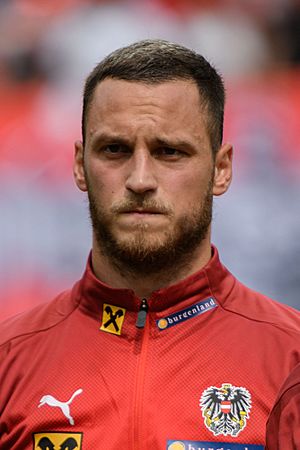
| Rank | Player | Caps | Goals | Period |
|---|---|---|---|---|
| 1 | Marko Arnautović | 125 | 41 | 2008–present |
| 2 | David Alaba | 107 | 15 | 2009–present |
| 3 | Andi Herzog | 103 | 26 | 1988–2003 |
| 4 | Aleksandar Dragović | 100 | 2 | 2009–2022 |
| 5 | Toni Polster | 95 | 44 | 1982–2000 |
| 6 | Gerhard Hanappi | 93 | 12 | 1948–1964 |
| 7 | Marcel Sabitzer | 89 | 21 | 2012–present |
| 8 | Karl Koller | 86 | 5 | 1952–1965 |
| 9 | Julian Baumgartlinger | 84 | 1 | 2009–2021 |
| Friedrich Koncilia | 84 | 0 | 1970–1985 | |
| Bruno Pezzey | 84 | 9 | 1975–1990 |
Top Goal Scorers
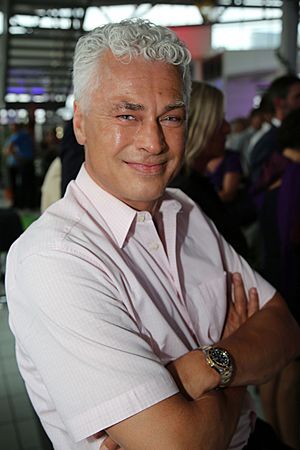
| Rank | Player | Goals | Caps | Ratio | Period |
|---|---|---|---|---|---|
| 1 | Toni Polster | 44 | 95 | 0.46 | 1982–2000 |
| 2 | Marko Arnautović | 41 | 125 | 0.33 | 2009–present |
| 3 | Hans Krankl | 34 | 69 | 0.49 | 1973–1985 |
| 4 | Johann Horvath | 29 | 46 | 0.63 | 1924–1934 |
| 5 | Erich Hof | 28 | 37 | 0.76 | 1957–1968 |
| Marc Janko | 28 | 70 | 0.40 | 2006–2019 | |
| 7 | Anton Schall | 27 | 28 | 0.96 | 1927–1934 |
| 8 | Matthias Sindelar | 26 | 43 | 0.60 | 1926–1937 |
| Andi Herzog | 26 | 103 | 0.25 | 1988–2003 | |
| 10 | Karl Zischek | 24 | 40 | 0.60 | 1931–1945 |
Tournament Records
FIFA World Cup History
| FIFA World Cup record | Qualification record | |||||||||||||||
|---|---|---|---|---|---|---|---|---|---|---|---|---|---|---|---|---|
| Year | Result | Position | Pld | W | D | L | GF | GA | Squad | Pld | W | D | L | GF | GA | |
| Did not enter | Did not enter | |||||||||||||||
| Fourth place | 4th | 4 | 2 | 0 | 2 | 7 | 7 | Squad | 1 | 1 | 0 | 0 | 6 | 1 | ||
| Withdrew | 1 | 1 | 0 | 0 | 2 | 1 | ||||||||||
| Did not enter | Did not enter | |||||||||||||||
| Third place | 3rd | 5 | 4 | 0 | 1 | 17 | 12 | Squad | 2 | 1 | 1 | 0 | 9 | 1 | ||
| Group stage | 15th | 3 | 0 | 1 | 2 | 2 | 7 | Squad | 4 | 3 | 1 | 0 | 14 | 3 | ||
| Did not enter | Did not enter | |||||||||||||||
| Did not qualify | 4 | 0 | 1 | 3 | 1 | 6 | ||||||||||
| 6 | 3 | 0 | 3 | 12 | 7 | |||||||||||
| 7 | 3 | 2 | 2 | 15 | 9 | |||||||||||
| Quarter-finals | 7th | 6 | 3 | 0 | 3 | 7 | 10 | Squad | 6 | 4 | 2 | 0 | 14 | 2 | ||
| Second group stage | 8th | 5 | 2 | 1 | 2 | 5 | 4 | Squad | 8 | 5 | 1 | 2 | 16 | 6 | ||
| Did not qualify | 6 | 3 | 1 | 2 | 9 | 8 | ||||||||||
| Group stage | 18th | 3 | 1 | 0 | 2 | 2 | 3 | Squad | 8 | 3 | 3 | 2 | 9 | 9 | ||
| Did not qualify | 10 | 3 | 2 | 5 | 15 | 16 | ||||||||||
| Group stage | 23rd | 3 | 0 | 2 | 1 | 3 | 4 | Squad | 10 | 8 | 1 | 1 | 17 | 4 | ||
| Did not qualify | 10 | 4 | 3 | 3 | 10 | 14 | ||||||||||
| 10 | 4 | 3 | 3 | 15 | 12 | |||||||||||
| 10 | 4 | 2 | 4 | 14 | 15 | |||||||||||
| 10 | 5 | 2 | 3 | 20 | 10 | |||||||||||
| 10 | 4 | 3 | 3 | 14 | 12 | |||||||||||
| 11 | 5 | 1 | 5 | 20 | 19 | |||||||||||
| Qualification in progress | 2 | 2 | 0 | 0 | 6 | 1 | ||||||||||
| To be determined | To be determined | |||||||||||||||
| Total | Third place | 7/22 | 29 | 12 | 4 | 13 | 43 | 47 | 136 | 66 | 29 | 41 | 238 | 156 | ||
| Austria's World Cup history | |
|---|---|
| First Match | (Turin, Italy; 27 May 1934) |
| Biggest Win | (Lausanne, Switzerland; 26 June 1954) |
| Biggest Defeat | (Córdoba, Argentina; 14 June 1978) |
| Best Result | Third place (1954) |
| Worst Result | Group stage (1958, 1990, 1998) |
UEFA European Championship History
| UEFA European Championship record | Qualifying record | ||||||||||||||||
|---|---|---|---|---|---|---|---|---|---|---|---|---|---|---|---|---|---|
| Year | Result | Position | Pld | W | D | L | GF | GA | Squad | Pld | W | D | L | GF | GA | ||
| Did not qualify | 4 | 2 | 0 | 2 | 10 | 11 | |||||||||||
| 2 | 0 | 1 | 1 | 2 | 3 | ||||||||||||
| 5 | 2 | 1 | 2 | 7 | 9 | ||||||||||||
| 6 | 3 | 1 | 2 | 14 | 6 | ||||||||||||
| 6 | 3 | 1 | 2 | 11 | 7 | ||||||||||||
| 8 | 4 | 3 | 1 | 14 | 7 | ||||||||||||
| 8 | 4 | 1 | 3 | 15 | 10 | ||||||||||||
| 6 | 2 | 1 | 3 | 6 | 9 | ||||||||||||
| 8 | 1 | 1 | 6 | 6 | 14 | ||||||||||||
| 10 | 5 | 1 | 4 | 29 | 14 | ||||||||||||
| 8 | 4 | 1 | 3 | 19 | 20 | ||||||||||||
| 8 | 3 | 0 | 5 | 12 | 14 | ||||||||||||
| Group stage | 13th | 3 | 0 | 1 | 2 | 1 | 3 | Squad | Qualified as hosts | ||||||||
| Did not qualify | 10 | 3 | 3 | 4 | 16 | 17 | |||||||||||
| Group stage | 22nd | 3 | 0 | 1 | 2 | 1 | 4 | Squad | 10 | 9 | 1 | 0 | 22 | 5 | |||
| Round of 16 | 12th | 4 | 2 | 0 | 2 | 5 | 5 | Squad | 10 | 6 | 1 | 3 | 19 | 9 | |||
| 9th | 4 | 2 | 0 | 2 | 7 | 6 | Squad | 8 | 6 | 1 | 1 | 17 | 7 | ||||
| To be determined | To be determined | ||||||||||||||||
| Total | Round of 16 | 4/17 | 14 | 4 | 2 | 8 | 14 | 18 | 117 | 57 | 18 | 42 | 219 | 162 | |||
UEFA Nations League History
| UEFA Nations League record | |||||||||||
|---|---|---|---|---|---|---|---|---|---|---|---|
| Season | Division | Group | Result | Pld | W | D | L | GF | GA | P/R | RK |
| 2018–19 | B | 3 | Group stage | 4 | 2 | 1 | 1 | 3 | 2 | 18th | |
| 2020–21 | B | 1 | Group stage | 6 | 4 | 1 | 1 | 9 | 6 | 18th | |
| 2022–23 | A | 1 | Group stage | 6 | 1 | 1 | 4 | 6 | 10 | 13th | |
| 2024–25 | B | 3 | Group stage | 8 | 3 | 3 | 2 | 15 | 8 | 22nd | |
| Total | Group stage | 24 | 10 | 6 | 8 | 33 | 26 | 13th | |||
Team Achievements
Major Competitions
- FIFA World Cup
 Third place (1): 1954
Third place (1): 1954
- Olympic Games
 Silver medal (1): 1936
Silver medal (1): 1936
Regional Competitions
- Central European International Cup
- Champions (1): 1931–32
- Runners-up (2): 1927–30, 1933–35
- Third place (2): 1948–53, 1955–60
Summary of Honours
| Competition | Total | |||
|---|---|---|---|---|
| FIFA World Cup | 0 | 0 | 1 | 1 |
| Olympic Games | 0 | 1 | 0 | 1 |
| UEFA European Championship | 0 | 0 | 0 | 0 |
| Total | 0 | 1 | 1 | 2 |
See also
 In Spanish: Selección de fútbol de Austria para niños
In Spanish: Selección de fútbol de Austria para niños
- Austria women's national football team
- Austria women's national under-19 football team
- Austria women's national under-17 football team
- Austria men's national under-21 football team
- Austria men's national under-19 football team
- Austria men's national under-17 football team


